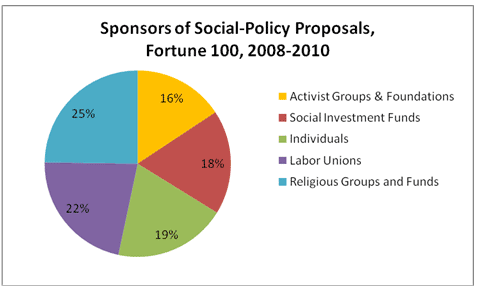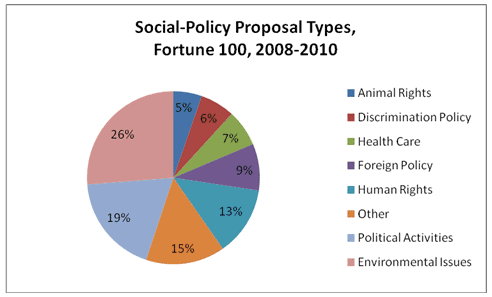NEW FINDINGS
Social Policy
Environmental Issues, Political Contributions Key Focus in Proxy Process
Religious Groups, Labor Unions Sponsoring Social-Policy Proposals
 PODCAST
PODCAST
Howard
Husock interviews
James
Copland about his New Findings from the ProxyMonitor database. In this
New Finding, Copland reveals that shareholders are making major efforts for
corporations to disclose their political campaign contributions even though
under Citizens United, the Supreme Court ruled corporate political expenditures
are speech protected by the First Amendment.
Among the most controversial shareholder proposals every proxy season are those related not to corporate governance processes or executive compensation but rather to issues like the environment and human rights. Shareholders who make and support such proposals laud them as a key mechanism for influencing corporate conduct. Critics contend that efforts to turn the proxy process into a vehicle for discussion of social and political issues undermine the traditional norms of the shareholder corporation,[1] potentially threatening American capital markets leadership.[2] Social and political questions, say critics, are better decided by the broader democratic polity. This Manhattan Institute Proxy Monitor Finding looks at data gathered from the Institute’s ProxyMonitor.org database to examine:
a) Key sponsors of social-policy shareholder proposals;
b)
Major areas of focus for social-policy proposals; and
c) Social-policy proposal voting results and expected trends.
a) Key sponsors of social-policy shareholder proposals
 Over the
last three years, a diverse group of shareholders has sponsored social-policy proposals on Fortune 100 corporate proxies. As with proposals related to executive compensation,[3] labor unions have played a significant role. From 2008 to 2010, the AFL-CIO was the most frequent sponsor of social-policy proposals, with nineteen of its proposals coming to a vote. Unions overall backed forty-six of the 215 social-policy proposals with an identified sponsor during that period (see graph
right).
Over the
last three years, a diverse group of shareholders has sponsored social-policy proposals on Fortune 100 corporate proxies. As with proposals related to executive compensation,[3] labor unions have played a significant role. From 2008 to 2010, the AFL-CIO was the most frequent sponsor of social-policy proposals, with nineteen of its proposals coming to a vote. Unions overall backed forty-six of the 215 social-policy proposals with an identified sponsor during that period (see graph
right).
Religious groups and their pension funds sponsored the largest number of social-policy proposals overall, with fifty-two from 2008 through 2010—25 percent of all identified social-policy proposals that came to a vote. Most prominent among the religious groups playing an active role were orders of Catholic nuns, in particular the Sisters of Charity of St. Elizabeth, which sponsored six proposals, and the Sisters of Mercy of the Americas, which sponsored five.
Protestant groups also were active in pushing social-policy shareholder proposals, in particular the Presbyterian Church (USA), which sponsored five proposals.
Other key players in sponsoring social-policy shareholder proposals over the last three years were “socially responsible” investment funds (in particular, Trillium Asset Management, which sponsored eleven proposals); individuals (in particular, John Harrington, who sponsored eight proposals); and various activist groups and foundations (in particular, the Free Enterprise Action Fund, which sponsored nine proposals).
Notably absent among proponents of social-policy proposals were
institutional investors unrelated to organized labor or social investment goals.
b) Major areas of focus for social-policy proposals
A majority of social-policy shareholder proposals submitted to Fortune 100
companies since 2008 have centered on three main themes: environmental issues,
corporate political activities, and human rights (see graph below).
 Environmental proposals have centered around encouraging companies to set greenhouse-gas emissions goals or ordering companies to issue reports on climate change/global warming or environmental sustainability. Proposals oriented around political activities have focused on forcing disclosure of corporate political contributions, trade association expenditures, or lobbying activities. Human-rights-related proposals have tended to call on corporations to establish human rights committees, embrace certain global human rights standards, or produce reports on human rights issues.
Environmental proposals have centered around encouraging companies to set greenhouse-gas emissions goals or ordering companies to issue reports on climate change/global warming or environmental sustainability. Proposals oriented around political activities have focused on forcing disclosure of corporate political contributions, trade association expenditures, or lobbying activities. Human-rights-related proposals have tended to call on corporations to establish human rights committees, embrace certain global human rights standards, or produce reports on human rights issues.
Other key categories of social-policy proposals have been those focused on the provision of weapons and supplies or otherwise focusing on foreign investment decisions (these proposals are principally sponsored by Catholic religious orders); those calling on corporations to embrace certain “health care” principles (these proposals are largely related to the health-reform debate); those pushing new antidiscrimination policies (these proposals are largely related to sexual orientation or gender identity); and those looking to change corporate practices based on certain animal-rights principles (these proposals are principally sponsored by the People for the Ethical Treatment of Animals and the Humane Society).
c) Social-policy proposal voting results and expected trends
Unlike shareholder proposals related to corporate governance and executive compensation,[4] not a single proposal related to social issues has been supported by a majority of shareholders among all Fortune 100 companies over the last three years. Twenty-three proposals, however, have gotten support from at least 30 percent of shareholders over that period. Ten of these twenty-three proposals relate to forcing disclosure of corporate contributions to political campaigns or trade associations. Three relate to greenhouse gas emissions or climate change, and three more relate to employment discrimination policy.
In the wake of the controversial
Citizens United Supreme Court decision holding that corporate political expenditures are speech protected by the First Amendment,[5] 2011 promises to be a year in which political-spending proposals gain even more prominence. According to the Proxy Preview 2011 report published by the corporate-social-responsibility foundation As You Sow, 23 percent of the shareholder proposals related to social policy introduced thus far in 2011 relate to political spending,[6] an even higher percentage than usual and almost as high a percentage as for proposals related to environmental issues (26 percent). Another significant trend to watch among social policy shareholder proposals is the increasing role being played by New York’s public-employee pension funds. According to As You Sow, the single-largest sponsor of such proposals to date in 2001 is the New York State Common Retirement Fund, with thirty-three, followed closely by the New York City pension funds, with twenty-seven.
This report analyzes information gathered from the Manhattan Institute’s ProxyMonitor.org database, which contains information relating to all shareholder proposals submitted for shareholder vote between 2008 and 2010, for the 100 largest American public companies.
ENDNOTES
- For a good summary of the cost-tradeoffs underlying shareholder corporations—in contrast with employee ownership, customer ownership, and other forms of governance—see Henry Hansmann, The Ownership of Enterprise (1996).
- See, e.g., America's Capital Markets: Maintaining Our Lead in the 21st Century, Testimony of James R. Copland, Director of the Center for Legal Policy at the Manhattan Institute for Policy Research, before the United States House of Representatives Committee on Financial Services, April 26, 2006.
-
See Manhattan Institute Proxy Monitor
Finding 1 (2011), available at
http://www.proxymonitor.org/Forms/Finding1.aspx.
- See Manhattan Institute Proxy Monitor Report (Winter 2011), available at
http://www.proxymonitor.org/Forms/Reports.aspx; Manhattan Institute Proxy Monitor Finding 1 (2011), available at
http://www.proxymonitor.org/Forms/Finding1.aspx.
- See Citizens United v. Federal Election Commission, 130 S. Ct. 876 (2010).
- Based on a sample of 360 shareholder proposals, current as of February 14, 2011.